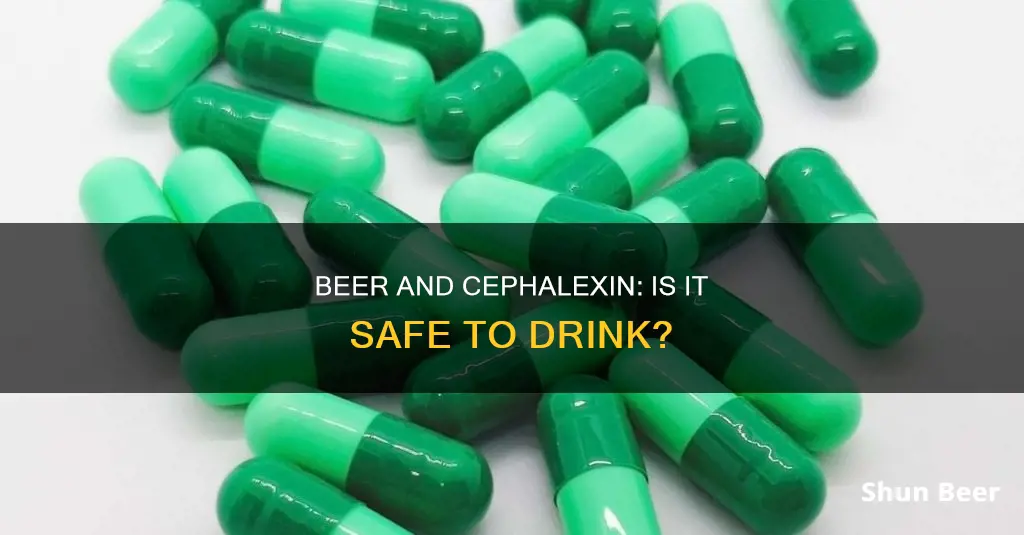
Although there is no direct interaction between cephalexin and alcohol, it is not recommended to mix the two. Cephalexin is an antibiotic used to treat bacterial infections, and while it doesn't directly interact with alcohol, the two substances can cause similar side effects, such as nausea, vomiting, and indigestion. Mixing the two could worsen these side effects. Additionally, alcohol can negatively impact your body's ability to heal and fight infections, potentially extending recovery time. It is generally recommended to avoid consuming alcohol while taking any antibiotics, including cephalexin, to ensure the effectiveness of the treatment and give your body the best chance to recover.
| Characteristics | Values |
|---|---|
| Is it safe to drink beer while taking cephalexin? | It is generally safe to use cephalexin with alcohol, but it can worsen symptoms of nausea, indigestion, and drowsiness. For this reason, it may be better to avoid alcohol during treatment. |
| Why might it be bad to drink beer while taking cephalexin? | Alcohol may also impact your body's natural healing process and decrease your body's ability to fight a urinary tract infection. |
| What are the side effects of cephalexin? | The most common side effects of cephalexin include indigestion, pain or discomfort around the stomach region, and diarrhea. Other serious side effects include hypersensitivity or allergic reactions and prolonged thrombin time, which may lead to an increased risk of bleeding. |
| What are the side effects of drinking beer? | The side effects of drinking beer include mood and behavioral changes and problems with coordination. Drinking large amounts of alcohol, especially over a long period, may lead to more serious adverse effects, such as inflammation of the pancreas, an increased risk of cancer, and a weakened immune system. |
What You'll Learn
- Cephalexin is an antibiotic used to treat bacterial infections
- Alcohol doesn't interact with cephalexin but may worsen side effects like nausea
- It is generally safe to consume alcohol in moderation while taking cephalexin
- However, alcohol may interfere with your body's ability to fight infections
- It is best to consult a doctor for advice on drinking alcohol while taking cephalexin

Cephalexin is an antibiotic used to treat bacterial infections
Cephalexin is typically taken by mouth and can be taken with or without food. It is important to follow the directions on the prescription label and take cephalexin at the same time every day. It is also important to continue taking cephalexin until the prescription is finished, even if symptoms improve. This is to ensure that the infection is completely treated and to prevent the bacteria from becoming resistant to antibiotics.
In addition to treating bacterial infections, cephalexin is sometimes used for certain penicillin-allergic patients who have a heart condition and are undergoing a dental or upper respiratory tract procedure. In these cases, cephalexin is prescribed to prevent the development of a heart valve infection.
While cephalexin does not directly interact with alcohol, it is generally recommended to avoid drinking alcohol while taking any antibiotics. Alcohol may enhance certain side effects of cephalexin, such as dizziness, drowsiness, and nausea. Additionally, alcohol may interfere with the body's natural healing process and decrease the body's ability to fight infections. Therefore, it is advisable to avoid alcohol during treatment with cephalexin to ensure optimal recovery and prevent potential side effects.
It is always a good idea to talk to a doctor or pharmacist about any concerns regarding medication and alcohol consumption. They can provide personalized advice based on an individual's medical history and medication regimen.
Beer in Nursing Homes: What's the Deal?
You may want to see also

Alcohol doesn't interact with cephalexin but may worsen side effects like nausea
While cephalexin is an antibiotic that is generally safe to use with alcohol, it is still advisable to avoid drinking during treatment. This is because alcohol may worsen side effects of cephalexin such as nausea, indigestion, and drowsiness.
Cephalexin and Alcohol
Cephalexin, or cefalexin, is an antibiotic that is commonly prescribed to treat various infections, including those of the skin, middle ear, upper respiratory tract, and urinary tract. It is considered a broad-spectrum antibiotic, meaning it is effective against a wide range of bacteria.
Alcohol and Side Effects
Although cephalexin does not directly interact with alcohol, the two substances can cause similar side effects. Consuming alcohol while taking cephalexin may enhance these side effects, including nausea, indigestion, dizziness, and drowsiness. Therefore, it is generally recommended to avoid alcohol during treatment with cephalexin to minimize the risk of experiencing these unpleasant side effects.
Impact on Infection and Recovery
In addition, alcohol may negatively impact the body's ability to fight infections and can interfere with the healing process. For individuals with an active urinary tract infection (UTI), alcohol may increase irritation and prolong recovery time. Alcohol tends to dehydrate the body, which can further irritate the bladder and hinder the body's ability to flush out the infection.
Recommendations
While moderate alcohol intake typically does not affect the effectiveness of cephalexin, healthcare providers usually suggest abstaining from alcohol during the course of treatment. This is especially important for individuals with a history of chronic alcohol consumption or liver problems. It is always best to consult with a doctor or healthcare provider for personalized advice, as they can consider an individual's medical history and specific circumstances.
Beer and Blood Pressure Medicine: Safe Mix?
You may want to see also

It is generally safe to consume alcohol in moderation while taking cephalexin
While cephalexin does not directly interact with alcohol, some people may experience enhanced side effects such as nausea, vomiting, indigestion, dizziness, drowsiness, and headaches when consuming alcohol while taking this medication. These side effects are similar to those caused by alcohol, and combining the two substances may worsen them. Additionally, alcohol may negatively affect the underlying infection being treated, as it can decrease the body's ability to fight infections and prolong recovery time.
It is important to note that general medical advice recommends avoiding mixing antibiotics with alcohol. This is because alcohol can cause unpleasant side effects, such as nausea, vomiting, and headaches, which can also be side effects of antibiotics. It may be challenging to determine which substance is causing these problems if both are consumed simultaneously.
Furthermore, alcohol may limit the effectiveness of antibiotics by interfering with the immune system and changing the way the body responds to infections. Alcohol is known to decrease immune system function and can impact the absorption and processing of the medication. Animal studies have shown that alcohol can decrease the absorption of cephalexin and may change the rate at which it leaves the body.
Therefore, while it is generally safe to consume alcohol in moderation while taking cephalexin, it is advisable to avoid or limit alcohol consumption during the treatment course to prevent potential side effects and ensure the effectiveness of the treatment.
Drinking Beer at Dollywood: What You Need to Know
You may want to see also

However, alcohol may interfere with your body's ability to fight infections
While cephalexin and alcohol do not have a direct interaction, it is important to understand how alcohol may interfere with your body's ability to fight infections. Alcohol can decrease your body's ability to fight infections, particularly urinary tract infections (UTIs). This is because alcohol can cause dehydration, prolonging bladder irritation. It can also disrupt your sleep patterns and cause gastrointestinal symptoms, all of which can impair your body's ability to recover from an infection.
Chronic alcohol consumption is known to weaken the immune system, hindering your body's ability to fight infections. Alcohol can also disrupt the absorption of nutrients in the gut due to its effects on the liver, pancreas, and stomach lining. This can lead to vitamin and mineral deficiencies, further compromising your body's ability to fight off infections.
Additionally, alcohol can have similar side effects to cephalexin, including nausea, indigestion, and drowsiness. Consuming alcohol while taking cephalexin can enhance these side effects, making them more severe. It is important to note that the side effects of alcohol and cephalexin can be difficult to distinguish, making it challenging to identify the cause of any unpleasant symptoms.
Animal studies have also shown that alcohol can decrease the absorption of cephalexin and may change the rate at which the medication leaves your body. This can impact the effectiveness of the antibiotic in treating the infection.
In summary, while cephalexin and alcohol may not directly interact, alcohol can interfere with your body's ability to fight infections by weakening the immune system, disrupting nutrient absorption, and causing similar side effects to the antibiotic. Therefore, it is generally recommended to avoid consuming alcohol while taking antibiotics, especially if you are treating an active infection.
Krups Beertender: Compatible With Other Beers?
You may want to see also

It is best to consult a doctor for advice on drinking alcohol while taking cephalexin
Cephalexin, also known as cefalexin, is an antibiotic commonly prescribed to treat various infections, including skin, ear, respiratory tract, and urinary tract infections. While cephalexin does not directly interact with alcohol, combining the two may enhance certain side effects, such as nausea, indigestion, and drowsiness. Therefore, it is recommended to consult a doctor to understand the potential risks and make an informed decision.
Additionally, alcohol can negatively impact your body's natural healing process and immune system, which may interfere with the treatment of infections. It is important to note that drinking alcohol while experiencing a urinary tract infection (UTI) can increase irritation and prolong recovery time. As such, consulting a doctor is crucial to ensuring that alcohol consumption does not hinder the effectiveness of the medication or prolong the recovery process.
Furthermore, alcohol consumption can cause unpleasant side effects such as nausea, vomiting, and headaches, which may overlap with the side effects of cephalexin. By consulting a doctor, you can gain a better understanding of the potential risks and make an informed decision about alcohol consumption during your treatment.
In summary, while cephalexin and alcohol may be safe to consume together, it is always best to consult a doctor for personalized advice. A doctor can provide guidance based on your medical history, current health status, and the specific details of your cephalexin prescription.
Beer and the HCG Diet: What You Need to Know
You may want to see also
Frequently asked questions
It is generally safe to consume alcohol while taking cephalexin as it does not directly interact with the drug or reduce its effectiveness. However, it is recommended to avoid alcohol during treatment as it may worsen side effects such as nausea, drowsiness, and indigestion.
The most common side effects of cephalexin include vaginal discharge or itchiness, dizziness, drowsiness, nausea, and stomach pain or discomfort. Less common side effects include abnormal liver tests and vaginitis, an inflammation of the vagina.
Cephalexin is a broad-spectrum antibiotic that can treat a wide range of bacterial infections, including urinary tract infections (UTIs), strep throat, skin infections, respiratory tract infections, ear infections, and bone infections.
Drinking alcohol while taking antibiotics can cause unpleasant side effects such as nausea, vomiting, and diarrhea. It can also negatively affect the body's natural healing process and decrease the strength of the immune system. Therefore, it is generally recommended to avoid consuming alcohol while taking antibiotics, including cephalexin.
It is generally safe to consume alcohol after completing your course of cephalexin. However, it is always a good idea to consult your healthcare provider or doctor for personalized advice, especially if you have any concerns or underlying health conditions.







